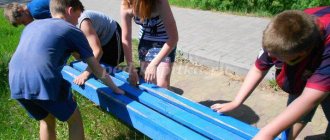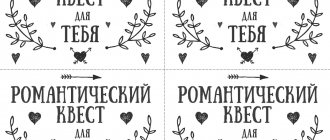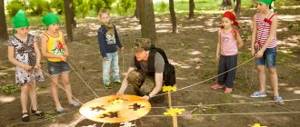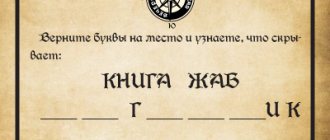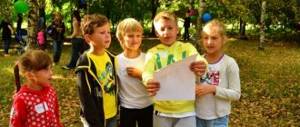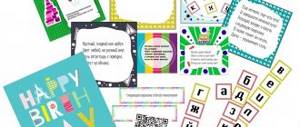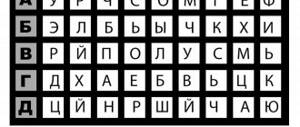What is a quest
This is a popular form of holding a themed party today, the goal of which is to achieve the set goal through step-by-step completion of various kinds of tasks, including answering quiz questions, solving puzzles, puzzles, and performing physical exercises.
The quest differs from other events on a military-patriotic theme:
- a variety of game material - to solve a game problem (often a search for an important report, a map of the location of enemy troops), the children complete tasks of an intellectual quiz, alternating them with sports competitions;
- dynamic - the quest for children involves team competition or completing tasks against a time limit, so the speed of solving game problems is decisive for the successful completion of the game (participants do not have time to get bored, because receiving the next task is possible only after completing the previous one, moreover, usually children cannot even assume the nature of the new game task);
- wider opportunities to express oneself - when forming a team, you need to gather players with different abilities, and not just with good physical fitness, as, for example, for the game GZR, or with a high level of intelligence, as, for example, for thematic quizzes, brain ring ;
- multi-stage achievement of the goal - for example, after completing all the tasks, the team receives fragments of the question, and not the whole question, and only by correctly adding all the elements and answering faster than the opposing team can we talk about victory.
For children of any age, the quest means an exciting adventure
Active tasks
There is a wonderful way to “dilute” a man’s mental work a little when completing a quest and add physical activity to the quest. To do this, you can use so-called “active tasks”. Their essence is that the player must perform some active action in order to receive the next clue. For example, you can make him do push-ups, pull-ups, squats and even dance, sing or draw!
Such tasks can be added to the quest as auxiliary ones. For example, if a player is stuck on some puzzle and cannot solve it, he turns to the quest organizer, i.e. to you, and you give him one of the cards with an active task. After completing the task, the player will receive a hint.
Such tasks will add additional fun and atmosphere to the quest.
What to consider when preparing a quest for Victory Day
When developing a quest for Victory Day, you need to consider:
- age of participants (the quest can be carried out starting from the middle group);
- number of participants (the younger the children, the more participants in the team, so preschoolers can be up to 12 people, and children 12-15 years old - 5-6 people) and composition (in kindergarten, parents can also be members of the team);
- venue - a room, a kindergarten/school, a plot in the courtyard of a kindergarten, a school sports ground, a city park (quests in the park are organized for children of high school age);
- the duration of the event, which is determined by the age of the players - for preschoolers - 30–40 minutes, for primary schoolchildren and teenagers - 60 minutes, if the game is played outside, in the yard, you need to take into account the error +/- 10 minutes, since in the open space, it is more difficult to take into account possible unforeseen circumstances (for example, if it rains unexpectedly, then the number of tasks will probably have to be urgently reduced);
- form and content of the game - the choice is determined by the goals and objectives of considering one or another aspect of the “Victory Day” theme at a specific age (for example, in older preschool age, the emphasis is on how the war affected the families of the pupils, so one of the stages of the quest may be the action “ Immortal Regiment" - children show photos and talk about a relative who fought);
- equipment and materials (determined by the form and content of the quest, for example, if schoolchildren are supposed to have access to task keys via a QR code, then stable access to the Internet is needed).
The Victory Day quest for preschoolers and schoolchildren takes the form of a team competition or is carried out in the strategy genre.
Set design
You can start the quest game in an original way using a special holiday card . It's durable and takes just a few minutes to cook (details included), with the first clue in the middle; Postcard format - A4. This set includes 2 postcards, use the option that best suits the occasion. When finished they look like this:
completing assignments
Thanks to a special decoder, clues and a prize for completing a military quest can be hidden in any convenient place. The kit includes 2 ready-made versions of the decoder - for indoors and outdoors. You can edit the template to make the seats fit your location.
In addition to the quest, we offer fun themed entertainment - a comic army quiz . The set includes cards with questions and symbolic rewards for correct answers. Players who collect the most awards can be rewarded with additional prizes. Upon completion of the military quest, all participants are awarded colorful commemorative certificates , the text of which can be edited at your discretion.
Victory Day quest format for children
As noted above, a quest is a synthetic form of entertainment. Moreover, the form of the game itself is determined to a large extent by the age of the players. More suitable for preschoolers:
- competitions (two teams compete to see who can complete tasks faster);
- searching for “treasure” (for example, while completing tasks, the guys look for the missing banner);
- helping the heroes (players help the hero get information, a map).
For schoolchildren, you can add an investigation to this list: the children complete a task in order to gain access to the next game task. For example, they arrange the events of the war in chronological order.
- Battle of Stalingrad.
- Lifting the blockade of Leningrad.
- German attack on the USSR.
Having received the required sequence of numbers - 3, 1, 2, determine the number of the office (312) in which the next task is hidden.
One of the stages of the quest may be attending a master class on folding triangles of letters to the front
Decor
One of the most challenging aspects of creating task cards is the design of the cards. Selecting or inventing tasks is one thing, but designing them beautifully is another thing entirely. If you know how to draw well with your hands, then a pack of felt-tip pens will help you and go ahead! Hand drawn is probably the best and most sincere option. If nature has deprived you of the talent to draw, then a computer can help. But there is a problem here too. Not everyone has at least basic skills in graphic editors such as Photoshop. If you are lucky and you either know how to draw with your hands or confidently use graphics programs, then the task is simplified for you.
To make the cards truly festive and “masculine”, you need to use elements typical for this theme in the design - the theme of the army, sports, cars, etc. Use restrained colors so that the cards are moderately festive and at the same time “severe” in a masculine way. We will save pink and red for the women's quest, but here it is better to use, for example, a khaki texture.
Examples of card design can be seen below.
Quest for men on February 23 Corporate quest in the office on February 23 Quest for boys on February 23 Quest for fathers and sons on February 23 Quest on February 23 “Big Race” Auto quest on February 23 Full list of quests on February 23
Preparing a quest for preschoolers
In kindergarten, according to the Federal State Educational Standard, the tasks of conducting a quest for Victory Day, in particular, enriching ideas about the holiday, expanding the conceptual apparatus, and instilling respect for the heroic past of the Motherland, involve an emphasis on solving riddles and recitation. And also on the team form of performing game tasks to develop the ability to build relationships in a team in the process of achieving a common goal.
Story ideas
Legends for preschoolers can be:
- “Partisans” - the commander or commanders, if the children are divided into two groups, receives a map of the area (the group’s area) indicating the movement plan with didactic tasks and outdoor games, the ultimate goal is to find the enemy’s hidden weapons;
- “Scouts” - children as a whole group complete physical training tasks, receive a briefcase, solve riddles and find the key to the briefcase in which a note is hidden indicating the location of the missing flag/banner;
- “Victory will be ours!” - guys in teams complete tasks (for example, solve puzzles), receive a letter - the task is to form a word from the letters.
Bank of tasks for playing with preschool children
For preschoolers, the quest tasks in different combinations include:
- puzzles;
- games (outdoor, didactic);
- rebuses, puzzles, crosswords.
The quest can include both recitation and performance of military songs that were learned in music classes.
One of the stages of the quest may be participation in a flash mob on the theme of Victory Day
Riddles for the quest
For the middle group, this block can include riddles about weapons, military equipment, and soldiers’ equipment:
- A trunk sticks out of the fence, He scribbles mercilessly. Those who are quick-witted will understand that this is... (Machine gun);
- Two caterpillars are crawling, a tower with a cannon is being transported. (Tank);
- Any military profession must be studied, in order to be a support for the country, so that there is no... (War) in the world;
- He decides everything in an instant, He accomplishes a great feat, He stands tall for honor. Who is he? Right. (Hero);
- He is ready for fire and battle, Protecting you and me. He goes on patrol and in the city, He will not leave his post... (Soldier).
For older preschoolers, you can add riddles about military professions:
- The plane is taking off, I'm ready to be in flight. I’m waiting for that cherished order to protect you from heaven! (Military pilot);
- At night, at noon, at dawn, he carries out the Service in secret. (Border Guard);
- The plane soars like a bird, There is an air border. On duty both day and night Our soldier is a military man... (Pilot);
- A brave and courageous warrior is worthy of respect: It is difficult to get behind enemy lines, to remain unnoticed, to remember everything, to find out, to tell in the morning at headquarters. (Scout);
- I am currently serving in the navy, and my hearing is good. There is a similar one in the infantry - We are friends with the walkie-talkie for good reason! (Radio operator).
Poems
Recitation can either be included in the form of a quest task, or be a kind of introduction before the game. Poetic lines for preschoolers can be chosen as follows:
- Victory Day May 9 is a holiday of peace in the country and spring. On this day we remember the soldiers who did not return to their families from the war. On this holiday we honor the grandfathers who defended their native country, who gave the peoples Victory and who returned peace and spring to us! (N. Tomilina);
- The May holiday - Victory Day is celebrated by the whole country. Our grandfathers put on the Military Orders. In the morning the road calls them to the solemn parade. And thoughtfully from the threshold the grandmothers look after them. (T. Belozerov);
- “No one is forgotten and nothing is forgotten” - Burning inscription on a block of granite. The wind plays with faded leaves and covers the wreaths with cold snow. But, like fire, at the foot there is a carnation. No one is forgotten and nothing is forgotten. (A. Shamarin).
Game block
In quests for preschoolers, outdoor games aimed at satisfying the children’s need for movement are a key element. Especially if the quest is supposed to be on the street. Usually 2-3 outdoor games are woven into the plot. However, given the synthetic nature of the adventure content, which involves tasks for both physical and intellectual training, the game includes 2-3 didactic games.
Table: games for quests in kindergarten
| Name of the game | Equipment | Rules | What age is it suitable for? |
| Didactic games | |||
| "Find the Shadow" | Pictures of military equipment with shadow |
| Middle group |
| "Our winners" | Pictures depicting military equipment | The teacher shows pictures of equipment, the children name the profession of the person who controls it (tank - tank driver, walkie-talkie - radio operator, etc.). | Middle group |
| "Dispatching to the Front" | Pictures depicting things a soldier needs for personal use |
| Senior group |
| “Who can assemble a machine gun faster?” | Two pictures depicting a machine gun |
| Senior groups |
| "Jolly tankers" |
|
| Senior groups |
| Outdoor games | |||
| “Sharp Shooter” (the game is more convenient to play on the street or in the gym) |
|
| Middle, senior groups |
| "Crossing" | Two balls |
| Middle, senior |
| "Sanitary unit" | Bandages |
| Elder |
| "Dangerous Intelligence" |
|
| Elder |
In the section of didactic games, puzzles are actively used: pictures depicting military equipment can be cut into several parts of different shapes - squares, rectangles, triangles, trapezoids.
Photo gallery: materials for the game “Find the shadow” and “Who can assemble the machine faster”
The game “Find the Shadow” can also be used at primary school age, complicating the task by requiring children to name the technique depicted
In the game “Find the Shadow” it is very important to complete the task correctly and quickly
In the game “Who can assemble a machine gun faster,” children learn to work as a team
Photo gallery: pictures for the game “Our Winners”
Answer: tanker
Answer: machine gunner
Answer: radio operator
Answer: anti-aircraft gunner
Photo gallery: pictures for the game “Sending to the Front”
Each soldier treasured his tobacco pouch; often it was a reminder of the dear person who gave him the tobacco pouch
Matches and soap were very scarce things at the front
A soldier at the front without a spoon is a hungry soldier, but a hungry soldier is not a fighter
A soldier cannot live without warm clothes
Despite the hardships, many soldiers managed to read books in quiet moments
A soldier needs a flashlight, but he must use it very carefully so as not to give away his location to his enemies.
The era of mobile phones began many years after the end of World War II
Photo gallery: rebuses, puzzles for preschoolers
Answer: army
Answer: Levitan
Which path should the border guard take to reach his outpost?
Examples of quest scenarios for preschoolers
The last stage of the quest may be the completion of a creative task, as, for example, in the script prepared by M.I. Gerasimova. and her colleagues “Victory Day is a holiday for the whole country,” in which children design a thematic wall newspaper (the background and materials were prepared in advance). The development can be used in working with middle school children.
An example of an outdoor quest with outdoor games as the basis of the event can be found in the development of M.S. Petukhova. "Scouts". The scenario is suitable for both middle and senior groups.
The quest can be part of the entertainment, the first part of which with recitation and conversation on the theme of Victory Day takes place in the music hall, and the second, the adventure itself, takes place on the street. At the same time, the basis of the quest is outdoor games. An example of such a structure could be the script by V.M. Staritsina. “Victory Day - May 9” for older preschoolers.
Despite their age, pupils of the older group can move along the route map, on which their section is marked and points with new tasks are marked. The teacher gets to the next station faster and voices the task. An example of such a quest, where children themselves “read” the map, can be seen in the script by E. Anosova “Victory Day”.
An outdoor quest for preschoolers is carried out in the form of a block of outdoor games, based on the results of participation in which the winners are determined
Table: Sharafutdinova E.I. Scenario of a quest game dedicated to Victory Day
| Preliminary work |
|
| Equipment |
|
| Progress of the game | Educator: - I will now read to you an order called “Action Plan”:
— A map will help you find the stars. The envelope contains one part of the card. The other three parts are hidden and you will receive them after completing the tasks. — Intelligence reported that the stars were hidden on our site. Guys, there are many of us, and if we go on a mission all together, the enemy may notice us. What do you think needs to be done to become less noticeable to the enemy? (Walk quietly, do not run, speak in a whisper). |
| Task No. 1. Demining the road. Examples are written on the mines (circles drawn with chalk), children must write the correct answer. | |
| Task No. 2. Cross the swamp. Children on wheels cross the “swamp”. They receive an envelope with a riddle. The correct answer indicates where to go next...> | |
| <… Task No. 5 “Crossing”. The guys need to jump through all 5 hoops on two legs as quickly as possible, without hitting them. | |
| <… Task No. 8. Find the shell. Children find a buried bottle in the sand. The last part of the plan is hidden in the bottle. | |
| Task No. 9 “Connect all the parts of the map and find out the place where the stars are hidden.” Children go to the veranda and look for the stars. The game ends and the team with the stars returns to the sports field. | |
| https://infourok.ru/kvest-igra-posvyaschyonnaya-dnyu-pobedi-v-starshey-gruppe-2518531.html | |
Video: the immortal regiment as one of the stages of the quest for preschoolers
Quest plot
The plot of the quest for February 23rd for boys (children) is that the children (child) receive a letter from a military intelligence colonel, whose special squad constantly monitors the most dexterous, smart and courageous children throughout the country, since when they grow up, these are the kind of boys will become the elite of military intelligence and will defend the Motherland. Text of the letter: “Well, now it’s time for us to meet! I am a colonel of a special military intelligence detachment, and for a year now the specialists of my detachment have been watching the smartest, dexterous and brave boys of our country. The purpose of the observation is to select guys who, when they grow up, will serve in my squad and defend their Motherland. It was precisely in order to make sure of your abilities that I compiled special tasks. By solving one task after another, you will be able to find all my secret hiding places. Having solved all the tasks, not only will you pass my test, but in the last cache you will be able to find a special gift! Take action! Don't waste a second!" CONCLUSION of the quest: After the guys solve all the tasks and pass all the tests, in the last cache the participant (participants) will find a congratulatory letter from the colonel, as well as a long-awaited reward - gifts for February 23. Text of the letter: “Soldier, I congratulate you on passing all the tests with dexterity and skill! Now I will know for sure that you will become a real defender of the Motherland! Since you have completed all my tasks, you have earned not only my trust and respect, but also a personal reward. Accept this gift from me. And remember, the time will come, I will definitely meet you! Now, take care of your family and protect your younger ones!”
Preparing a quest for schoolchildren aged 8–11 years
The form and content of the game on the theme of Victory Day for schoolchildren in grades 1–5 differ from the structure of quests for older preschoolers in terms of duration and complicated tasks. And also an assessment of the team’s work at each stage of the game - the totality of these results forms the overall outcome of the quest.
Plot options
Storyline ideas for children 8–11 years old:
- “Dear Wars...” - teams (can be from different classes) go through stations with tasks according to their route sheet, for successful completion they receive a puzzle element at each point, put together a picture, say what is shown on it, and also give other known information ( for example, the guys put together fragments of the photograph “Victory Banner over the Reichstag”; if they know it, they name its author - Soviet war correspondent E. Khaldei);
- “Saboteurs” - a team (students of the same class) searches for a map of the location of rival troops, completing tasks along sections of the route (the essence is the same as passing stations, but the quest is aimed at one group of children, and not at teams);
- “Liberators” - a group of participants performs tasks to rescue a captive military leader (his role is played by a teacher or parent).
For children in grades 1–5, the quest is based on knowledge about the Second World War and Victory Day obtained during preliminary work: explanations from the teacher, parents, excursions to war monuments
Database of materials for schoolchildren aged 8–11 years
The composition of the quest for students in grades 1–5, in addition to the types of tasks described for preschoolers, includes:
- coming up with a name and motto for the team, choosing a captain;
- creating rebuses (for example, if two teams participate in a quest, then one of the tasks can be to come up with an anagram rebus for each other, for example, from two words to create a third on a military theme - ring + zone = garrison);
- answers to quiz questions.
Games for younger schoolchildren must include the singing of war songs. The wording of the task could be as follows: “Choose from the three proposed songs the one you like best, and perform it to the accompaniment of a music teacher or to the “minus.”
Options for names and mottos for teams
Teams can use the following names and mottos:
- “Landing”: We are landing and it’s cool! Let's beat anyone in the game!
- “Border Guards”: Not a single violator nearby - the Border Guard will protect you as it should!
- “Heroes”: I’m glad to welcome you, Our squad of heroes! We firmly know victory, and we will not yield to anyone!
- “Motherland”: Whoever is faithful to the Motherland and exemplary in battle, Let everyone know, Always wins!
- “Patriot”: We always move forward, After all, we are a team - Patriot! Dexterous and brave, we will do everything for victory!
Poems and riddles
Poetic lines in quests for school-age children are usually a kind of introductory word before the start of the game. In addition to the presentation of the name and motto. For example, these:
- Guys, I was at war, I went into battle, I burned in fire. Freezing in the trenches near Moscow, But, as you can see, he’s alive. Guys, I didn’t have the right to freeze in the snow, to drown at the crossings, to give my home to the enemy. I had to come to my mother, grow bread, mow the grass. On Victory Day, together with you, See the blue sky. To remember everyone who died in a bitter hour and saved the earth... This is what I’m talking about today, guys: We must take care of the Motherland in a holy soldier’s way! (V. Stepanov);
- Grandma put on the medal and now she’s so beautiful! She celebrates Victory Day, remembering the great war. Grandma's face is sad. There is a soldier's triangle on the table. Grandfather’s letter from the front is very painful for her to read even now. We look at grandfather’s portrait and shake hands with my brother: “Well, what kind of grandfather is this?” He's still just a boy! (V. Turov);
- The beauty that nature gives us was defended by soldiers in the fire, May Day of 1945 became the last point in the war. For everything that we have now, For each of our happy hours, For the fact that the sun shines on us, Thanks to the valiant soldiers - Our grandfathers and fathers. It’s not for nothing that fireworks sound today in honor of our Fatherland, in honor of our soldiers! (A. Surkov).
As for preschoolers, riddles for children 8–11 years old can form the basis of one of the stages of the quest:
- Breathes fire, bursts with flame. (A gun);
- If it flies, it barks, if it falls, it crumbles. (Projectile);
- It doesn’t look like a cannon, but God forbid it fires. (Mortar);
- There is a turtle standing - a steel shirt, the enemy is in the ravine - and where is the enemy. (Tank).
Questions on the topic
The selection of questions can be focused on the level of general knowledge of children on military topics. For example, give an answer to a riddle question (can be organized as a blitz, for which 1 minute is allocated):
- unexpected command (alarm);
- soldier's socks (foot wraps);
- ship's kitchen (galley);
- soldier's prison (guardhouse);
- news from home (letter);
- Every simple soldier (general) dreams of becoming one;
- ship's cook (cook);
- soldier's coat (overcoat);
- non-negotiable (order).
Questions can also be of a general nature:
- When did the Second World War begin and end?
- What was the name of our Motherland during the war?
- Which state attacked our country?
The final stage of the quest is the task of folding a letter from the front in the shape of a triangle
Games for schoolchildren aged 8–11 years
The game block is focused more on outdoor games, so either the entire quest should be carried out outside, or some part of it.
Table: examples of games for quests for children 8–11 years old
| Name of the game | Equipment | Rules |
| Didactic games | ||
| "Find 10 differences" | Paired pictures |
|
| Puzzles | Thematic pictures, cut into 10–12 parts. | Children, by command or temporarily, put together a puzzle to move on to the next stage. |
| Outdoor games | ||
| “Obstacle course” (on the street or in the gym) | Children overcome a wall (a loophole on the playground), use a rope to cross a swamp (mats), along a log, snake between the wheels, etc., depending on what is available on the playground. | |
| "Sniper" |
|
|
| "Forced March" | Two bags with cargo |
|
Photo gallery: materials for the game “Find the Differences”, puzzles and rebuses
A puzzle with an Eternal Flame-star can be put together even by children in the middle group, since the symmetrical details of the picture make it easier and, therefore, speed up the game process significantly
To complicate the task, you can ask children to name the main features of each type of equipment.
If the picture contains close-ups of people, the number of fragments may be greater
Pictures with explosions and battles should not be cut into many elements - the plot is already complex, there is no need to “complicate” it even more
There are 17 differences in this picture.
The captain can voice the answers to the puzzle
How to write a quest script
Having selected material suitable for the topic, the teacher organizes the tasks in the sequence necessary to implement the idea. For example:
- solving arithmetic problems;
- outdoor games;
- guessing riddles;
- folding the puzzle.
Examples of quest scenarios
The completion of tasks at stations is assessed by the head of this particular stage. You can get acquainted with the principles of evaluating children's answers in the development of Savchuk A.V. “On the roads of the Great Patriotic War...”. This scenario also includes a dramatization task: children are taught the role they need to play in the proposed circumstances. For example, a soldier needs to get to the headquarters to convey a report from the center.
Original tasks at stations (for example, solving anagrams) can be found in the script by L.I. Makarova. “The game is a quest dedicated to the Great Victory.” The script can include blocks or individual tasks on the history of the native land during the Second World War. An interesting option for implementing this educational component in the context of Novosibirsk is presented in the script by V. I. Orlova “I remember! I'm proud!".
Video: quest for Victory Day for children 8–11 years old
Preparing a quest for children 12–15 years old
The main difference between quests for children of this age is that before the event, preparatory work must be done in the classroom or at home. In the process of preliminary study of the topic, children can learn about important events of the Second World War. For example, a list of Hero Cities, names of the main battles, dates of the siege of Leningrad, names of commanders-in-chief, etc.
According to the Federal State Educational Standard, topics related to the study of the Second World War are included in the Russian history program starting from the 9th grade.
As for the location of the quest, most often it is one thing: either a room (school) or a street (sports ground, park). In the first case, the tasks are more in the nature of a quiz, in the second - a military sports game. And since today the holding of military-patriotic sports games “Zarnitsa” and “GZR” is a traditional event in many schools, the quest is most often organized in the format of an intellectual game.
Plot outline ideas for a quest with teenagers aged 12–15 years
Legends for the quest can be like this:
- “Dear Liberators” - the guys, completing tasks, “liberate” a city or region, that is, each solved game task is the “defeat” of the fascists;
- “A trip to the Hero Cities” - participants complete tasks related to military events in the Hero Cities, in each city the guys receive a fragment of a key (for example, a word from a song), the goal is to collect a text from the fragments;
- “Scouts” - the guys complete tasks, receiving a fragment of the key with the final task, the solution of which is the goal of the game (decipher the names of key figures in the Soviet army).
Bank of materials for the quest
The quest for children aged 12–15 is based on knowledge of historical material.
Questions on the topic
The block of erudition questions is designed to test the children’s general level of knowledge on the topic. For students in grades 6–9, it is decisive.
- Which Hero City is presented in the photo (Brest, Stalingrad, Kyiv, Leningrad, Moscow, Odessa, Sevastopol, Kerch, Novorossiysk, Minsk, Tula, Murmansk, Smolensk).
Answer: Brest
- What made N.F. famous? Makarov, M.T. Kalashnikov, V.A. Degtyarev? (They were the inventors - N.F. Makarov - a pistol, M.T. Kalashnikov - an assault rifle, V.A. Degtyarev - a machine gun).
- What was the popular nickname for the guards mortar “BM-13” during the Great Patriotic War? ("Katyusha").
- Which tank was considered the best during World War II? (T-34).
In the quest, one of the stages of achieving the goal may be the task of deciphering proverbs and sayings on the topic of war and the army.
As an erudition task, ninth-graders can be asked to take a short test on their knowledge of basic facts about the Second World War.
The intellectual block can be composed in the form of the “Victory Alphabet”: a riddle question is created for each letter of the alphabet. For the scenario, you can take several questions, from the first letters of the answers to which an encrypted word is formed. For example, the word “victory”:
- this branch of the army was called the queen of the fields (infantry);
- award (order);
- it happens hand-to-hand (combat);
- anti-tank barrier (hedgehog);
- what should be ironclad in the army (discipline);
- this branch of the army was called the god of war (artillery).
Riddles can be distributed among points in other stages of the quest, so that children receive “letters” one at a time.
Games
The following tasks can be included in this block:
- “Identify a Hero” - the guys connect the portrait of USSR marshals with their names;
- “Assemble the puzzle” (for this task you can take a portrait of Marshal A.M. Vasilevsky);
As a child, the future Marshal Alexander Mikhailovich Vasilevsky dreamed of becoming an agronomist or land surveyor
- “Fold a red cross” (participants need to fold a cross from scraps without making any cuts).
Photo gallery: materials for the games “Identify the Hero” and “Fold the Red Cross”
In the post-war years, Marshal Georgy Konstantinovich Zhukov received the popular nickname “Marshal of Victory”
Marshal Rodion Yakovlevich Malinovsky was the only major Soviet military leader of the Great Patriotic War who spoke several European languages fluently
Konstantin Konstantinovich Rokossovsky is the only marshal of two countries in the history of the USSR: Marshal of the Soviet Union and Marshal of Poland
Elements for the red cross can be made from paper
Children can fold a cross as a team or choose 2-3 people for this task
Quest scenarios for teenagers
In the game for children aged 12–15 years, questions related to famous monuments dedicated to the Second World War can be included in erudition tasks. An interesting version of the wording of the task is presented in the script by Shutova E.A. “On the roads of the Great Patriotic War...”.
The game can be organized in the format of a “double” quest: in order to receive the task indicated in the route sheet, children must use the clues to determine the place where to find it, or the person who will voice this task. Moreover, each team has its own hints. This version of the quest is presented in the development of N.S. Zhirova. "On the roads of the Great Patriotic War."
The goal of the quest for teenagers may not be related to the “Victory Day” theme, provided that all tasks are based on it. So, in the script “All Inclusive” by M.N. Sokolova. The guys, completing assignments on the topic, get the password for the school Wi-Fi and earn an “A” in history.
The quest can be organized so that children have the opportunity to take 1-2 tips from the leader in case of difficulties in completing the task. And after solving a game problem, participants receive not only the key to the next stage, but also part of the key to completing the final task. An example of such an organization of the game can be found in the script by O.S. Kantonistova. “Quest for Victory Day”, based on materials from the history of his native land (Kaliningrad region) during the Second World War.
A carefully thought out and organized example of a quest in the park could be the scenario of Alekseevich E.I. “Great victories of a great people”: participants move along the route to the Hero Cities, complete a task there, receive a hint, with which they go to the organizers for further instructions.
Quest tasks
All tasks in the quest have a colorful design, a thematic, fun and festive plot. Description of the tasks in the quest: ◊ Sea battle - a task in which the quest participant needs to shoot down enemy ships with 8 missiles. After making 8 accurate shots, the quest participant will be able to find out the name of the next cache. ◊ Anti-tank defense - a task in which the participant will have to properly load all firearms and prepare for battle. Only after loading everything correctly, the name of the next cache will be found. ◊ Air defense is a fun task in which, based on the silhouettes of planes on the radar, you need to understand where “friends” are and where “foes” are. Having found your planes, their markings will show the necessary key letters from which you will need to create the name of the next hiding place. ◊ Cartographer - an attentiveness task in which the participant will have to find key letters using an existing map of a military battle. Then, using the solution algorithm, decipher the name of the next cache location. ◊ Assigned ranks - a secret task in which the participant will have to solve a ciphergram, the solution algorithm of which is based on army ranks. ◊ Military training ground is a simple logic puzzle in which you need to use the weapon’s gun sight to understand in which direction the bullet flew and in which side of the target it made a hole. ◊ Artillery command post
is an interesting task in which the participant needs to save the world by disabling the launch of enemy missiles.
Using the available items in the command post, the participant will find a solution algorithm that will allow him to find out the “missile launch cancellation key”, as well as the name of the next cache location. ◊ Scout's ciphergram is a logical task in which, based on part of the decrypted text, you need to decipher the second encrypted part of the same text. Having deciphered the ciphergram, the hiding place will be found. ◊ Weapons depot is an interesting puzzle in which you need to decipher the next hiding place based on the existing markings of weapon boxes. ◊ Orienteering is an easy and fun task in which the participant needs to find the correct key letters of a secret word (cache place) by taking a known number of steps in different directions.
You can read reviews about our quests here “Reviews”.


